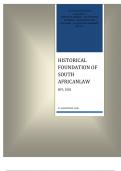Second semester of 2024
Assessment 1
COMPLEETE ANSWERS , 100 % TRUSTED
WORKINGS , EXPLANATIONS AND
SOLUTIONS , ALL QUESTIONS ANSWERED
FOR YOU
HISTORICAL
FOUNDATION OF
SOUTH
AFRICANLAW
HFL 1501
21 AUGUST2024 13:00
, HFL1501 : QUESTIONS This assessment is an elective assessment. Due date: 13:00 on Wednesday, 21
August 2024
QUESTION 1
1.1 One specific system of law mentioned in the HFL1501 Study Guide that is
unofficially applied by certain communities but not officially recognized in South Africa is
"indigenous law."
1.2 South Africa does have a hybrid legal system. This is because South Africa's legal
system is a combination of common law, customary law, and statutory law. Common
law is derived from English law, customary law is based on indigenous customs and
traditions, and statutory law is legislation enacted by the government. The coexistence
and interaction of these different legal sources make South Africa's legal system hybrid
in nature.
1.3 The universal component of the South African legal system has its origins in two
different philosophies: Roman-Dutch law and English law. Roman-Dutch law is based
on Roman law and the legal system of the Netherlands, while English law is derived
from the legal system of England. These two philosophies have influenced the
development of the legal system in South Africa.
Q2
(1) The historical Act mentioned in the HFL1501 Study Guide that contained the
repugnancy clause is the Black Administration Act, Act No. 38 of 1927.
(2) The repugnancy clause does not apply in South African law today. This is because
the Constitution of South Africa, specifically in Section 39(2), states that when
interpreting any legislation, and when developing the common law or customary law,
every court, tribunal, or forum must promote the spirit, purport, and objects of the Bill of
Rights. The Bill of Rights enshrines principles of equality, human dignity, and non-
discrimination, among others. Therefore, the repugnancy clause, which limited the
application of indigenous African law based on Western notions, would be contrary to
the principles of equality and non-discrimination as enshrined in the Constitution.
Q3




